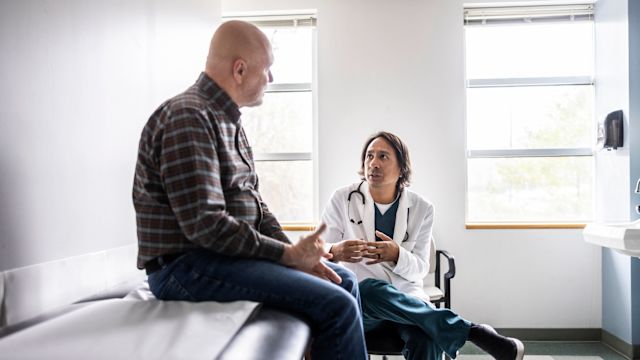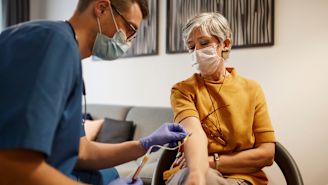When you learn your diagnosis is chronic lymphocytic leukemia (CLL)—a type of cancer that starts from cells in the bone marrow and moves into the blood—you’ll likely have many questions. But hearing the word “leukemia” may leave you so rattled that you have a hard time thinking of the “right” questions to ask. Once you’re ready, though, you should not hesitate to approach your healthcare provider with any queries or concerns about your diagnosis. While your information needs will depend on your specific situation, many patients will seek to have some of these essential questions answered:
What stage of CLL do I have, and what are the implications for my treatment and expectations?
Cancer staging gives information about the extent of the disease. In the case of CLL, stages range from increased white blood cells only to increased white blood cells, enlarged liver, spleen, and lymph nodes and effects on red blood cell counts. Treatment will depend on stage. For example, because of how slowly CLL progresses, some patients with early stage disease won’t need immediate treatment.
Will I need more tests after my diagnosis?
After a CLL diagnosis, your healthcare provider will perform tests to determine the stage of the disease. These tests can include scans such as magnetic resonance imaging (MRI), which does not involve x-rays, or a computed tomography (CT) scan, which does. These tests may involve injection of a dye or a tracer that can highlight areas where certain molecules accumulate, providing useful information about disease stage. Another kind of imaging format is ultrasound, which uses sound waves to create an image of organs such as the liver or spleen. It is painless and noninvasive.
You might also have more blood tests to check for problems with kidney or liver function. Finally, in some cases, a bone marrow sample might be taken so that a pathologist can assess the microscopic appearance and the chemical and genetic characteristics of the cells.
What information will these tests add?
The information from these tests will help establish the stage of disease and to check if treatment is working. The staging system used in the United States classifies CLL into five stages, labeled 0, I, II, III and IV. Someone with stage 0 disease has an excess of white blood cells called lymphocytes, but no other signs. Stage I involves both elevated lymphocyte counts and swollen lymph nodes, while stage II involves these two features and an enlarged spleen and possibly an enlarged liver. Stage III CLL will also include reduced red blood cell counts, and in Stage IV disease, the patient will also have too few platelets, components of blood which are important for clotting.
What are my treatment options?
If you have early stage CLL, you may receive no treatment at all and instead undergo close monitoring. The reason is that this stage of disease is considered “indolent” or slow moving. If treatment is initiated, options will include radiation, chemotherapy, surgery or targeted therapy, a group of therapeutic drugs that typically target only the cancer cells. You may also receive blood or platelet transfusions.
“Watchful waiting” (no treatment at all) and chemotherapy are the more common treatment approaches. Radiation and surgery are used for patients with enlarged lymph nodes or an enlarged spleen. Targeted therapy includes a variety of options, including molecules that inhibit tumor growth signals or tag tumor cells for destruction.
What are the risks and side effects associated with treatment options?
The side effects of these treatments vary, and you should go over them carefully with your healthcare provider. Among them are bleeding risk, especially if platelet counts are low from the disease itself or from chemotherapy or radiation treatment. An intractably dry mouth is also a common side effect that can lead to a chain of problems with oral health, including pain, soreness, gum disease and eating difficulties.
The only treatment that could potentially cure CLL is a bone marrow or stem cell transplant, but this procedure is usually reserved for patients who are younger or who have advanced disease.
How long will I need to undergo treatment, and will I have to repeat treatment?
The length of treatment depends on the option you choose, how well it works and how long its effects last. Once a treatment has halted the disease, you can expect to continue seeing your healthcare provider every few months for checkups.
If a treatment stops working or doesn’t stop disease progression, you will be switched to another treatment regimen. For patients who have gone through a number of treatments and still have recurrent or persistent disease, however, the choices begin to narrow. Options at this point might include treatments that limit symptoms as much as possible but can’t halt the disease. This kind of treatment, called palliative care, helps the patient maintain a good quality of life while making decisions about their next steps, including looking at hospice care options.
About half of patients who are diagnosed in the early stages of CLL will live longer than 12 years after the disease is detected. Your doctor may be able to tell you more based on the specific characteristics of your condition.
Should I seek a second opinion about my diagnosis or treatment?
Short answer: yes. If the disease is in the early stage, you will have time to seek out another provider to discuss diagnosis, staging or treatment options if you wish to do so. In fact, it’s important enough that you can ask your treatment team for recommendations for other providers.
Will I develop some other kind of cancer after having CLL?
Having one kind of cancer and receiving treatment for it unfortunately doesn’t protect you from other types of cancer. With a CLL diagnosis, risks for some other cancers actually increase. These cancers include some head and neck cancers (such as those of the nose, lip, salivary glands or larynx), melanoma of the skin, lung cancer and Hodgkin lymphoma. Women who have had CLL also are at increased risk for rectal cancer. The key is to remain in close contact with your doctor.





